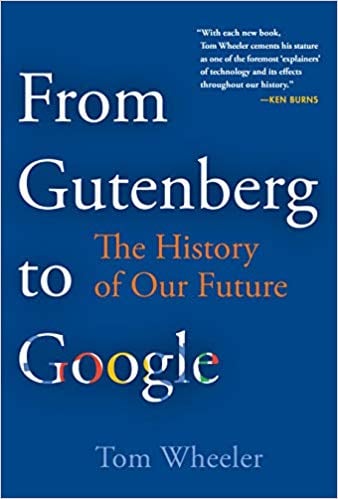You have /5 articles left.
Sign up for a free account or log in.
 From Gutenberg to Google: The History of Our Future by Tom Wheeler
From Gutenberg to Google: The History of Our Future by Tom Wheeler
Published in February of 2019.
I had a hard time separating the qualities of From Gutenberg to Google - which are many - from the resume of its author. Tom Wheeler served as the Chairperson of the Federal Communication Commission (FCC) from 2013 to 2017. Wheeler's work at the FCC, most notably the regulations regarding net neutrality, has been systematically dismantled by the current administration.
From Gutenberg to Google is not a book about the future of telecommunications. Wheeler has chosen not to offer an intellectual case for the Obama era policies. Nor does he spend much time on the likely employment or social implications of the dominance of new tech (Amazon/Google/Facebook/Apple/Microsoft) over legacy media companies.
What Wheeler does do is describe three previous information revolutions, the printing press, the railroad, the and the telegraph. Wheeler's goal is less to offer an exhaustive account of these three world-changing inventions. Instead, he uses the birth and development of these inventions to illustrate that our latest communications advances are as much evolutionary as revolutionary.
In this telling, AI and big data and cloud computing and IoT are all part of a sweeping narrative of information creation and diffusion. Each of the three previous technological leaps were accompanied by resistance, social anxiety, and economic fear. Each information revolution seems to come with an unshakeable belief that new technologies, and the industries that are built around their creations, will inflict irreparable harm.
Today, the smart set spends much bandwidth worrying about the effect of social media and smartphones on the ability of young people to form meaningful relationships. We worry about the impact of Facebook on civil discourse, the downsides of having our data monetized by Google, and of Amazon as a destroyer of bricks and mortar retail.
I worry about all these things - most especially the monopoly that Amazon has developed in digital books.
From Gutenberg to Google is not an argument to stop worrying about world conquering tech companies, or an AI/IoT/Cloud/Big Data-driven jobless future. Wheeler hardly addresses any of those concerns. Instead, From Gutenberg to Google asks that we put whatever concerns we have about tech in society in the context of past concerns about equally world-shifting information technologies.
All that worry over the printing press and the railroad and the telegraph ended up being not all that productive. Rather than working to leverage these inventions to improve social and economic conditions, many contemporaries to their births tried to stop them from coming into the world. But just as these information technologies could not be resisted in their time, it is unlikely that we will stop the spread of connectivity and sensors and big data and handheld/wearable computers.
Would I have liked it if Wheeler spent more time extending his narrative to the future of communications technologies? Sure.
From Gutenberg to Google is a concise book that covers much historical ground. The tradeoff in readability and brevity is too little in the way of forecasting.
What books do you like that situate a discussion of the future in an analysis of the past?
What are you reading?




